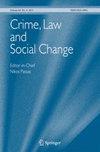“可能是我们干的。”同行对荷兰银行业洗钱违规行为的反应
IF 1
4区 社会学
Q3 CRIMINOLOGY & PENOLOGY
引用次数: 0
摘要
许多文献关注的是政府或公众对企业丑闻的社会反应。然而,关于同行(同一行业的公司)对公司越轨行为的反应的研究很少。由于企业面临着一种时代精神,其特征是对企业越轨行为的关注和反对日益增加,它们被迫对外部对其行为以及同行行为的“标签”做出反应。在公众监督日益增加的背景下,本文探讨了公司(员工)如何应对不正常的同伴行为。为了研究这个问题,本文采用了荷兰银行业不遵守反洗钱(AML)法规的案例研究。研究确定了同伴互动的六个阶段,即恐慌与恐惧、比较实践、疏远、投资、合作与反抗。在这六个阶段中,同伴之间的谴责是偶然的,主要是作为一种保护自己声誉的工具(防御机制)。同伴反应是由行为的特征(违反行为的分离)、行动者(作为同伴的可比性和认同)、受众(执行类型和公众关注)和情境(对违反行为的了解)决定的。随着“反洗钱”案件在整个行业的传播越来越频繁,防御机制也在扩大,从而导致银行之间的合作和对监管机构的蔑视。本文章由计算机程序翻译,如有差异,请以英文原文为准。
‘It could have been us’. Peer responses to money-laundering violations in the Dutch banking industry
Abstract Much literature has focused on societal responses to corporate scandals, either by authorities or the public. However, there is little research on responses to corporate deviance by peers (corporations in the same industry). As corporations face a Zeitgeist characterised by increased attention to, and disapproval of, corporate deviance, they are compelled to respond to the external ‘labelling’ of their behaviour, as well as that of their peers. In this context of increasing public scrutiny, this article explores how (employees at) corporations respond to deviant peer behaviour. To examine this question, the case study of non-compliance with anti-money laundering (AML) regulations in the Dutch banking industry is utilised. Six stages of peer interactions were identified, namely, panic and fear, comparing practices, distancing, investing, and cooperation and defiance. In these six stages, condemnation between peers is incidental and mainly functions as a tool to guard their reputation (defence mechanism). Peer responses are determined by characteristics of the act (severance of the violation), actor (comparability and identification as peers), the audience (type of enforcement and public attention), and the situation (knowledge on the violation). As AML cases spread become more frequent across the industry, defence mechanisms also expand, thereby resulting in cooperation between banks and defiance of regulators.
求助全文
通过发布文献求助,成功后即可免费获取论文全文。
去求助
来源期刊

Crime Law and Social Change
Multiple-
CiteScore
2.50
自引率
0.00%
发文量
53
期刊介绍:
Covers crime and deviance at the global, national, regional and local level, worldwideHas a special focus on financial crime, corruption, terrorism and organizational crimeWelcomes criminological research in the areas of human rights, comparative and international criminal law and criminal justice Crime, Law and Social Change publishes peer reviewed, original research articles addressing crime and the political economy of crime, whether at the global, national, regional or local levels, anywhere in the world. The Journal often presents work on financial crime, corruption, organized criminal groups, criminal enterprises and illegal markets, state crime, terrorism and security issues, cybercrime, cross-border crime and environmental crime. In addition, Crime, Law and Social Change welcomes criminological research in the areas of human rights, comparative and international criminal justice, compensation and justice for serious crime victims, international criminal law and cooperation. Finally, the Journal publishes multi-disciplinary criminological research focusing on gender, age, racial and ethnic equality issues.
 求助内容:
求助内容: 应助结果提醒方式:
应助结果提醒方式:


